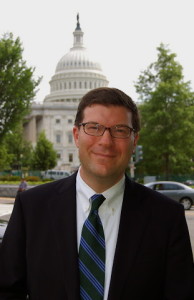This is the second blog post in the Wisconsin installment of the “Advoating on the Road” series.
“Thanksgiving of 2011 was a very difficult day for a lot of Wisconsin families,” the Rev. Lisa Bates-Froiland of Redeemer Lutheran Church in Milwaukee says, reflecting on the recent controversies in her state regarding collective bargaining and the ensuing division the debate created. “I heard many stories about ‘bad times’ at family get-togethers. The deep polarization silenced healthy discourse and balkanized communities in Wisconsin — it impacted who people would go to coffee with, even who would remain Facebook friends,” she explained.
Pastor Lisa also serves as executive director of the Zeidler Center for Public Discussion, a nonpartisan civic-minded ministry of Redeemer Lutheran Church. Recognizing how this polarization affected her community, she said “yes” to an invitation from the Greater Milwaukee Synod of the ELCA. The Synod had recently decided to study the collective bargaining debate, which was very much impacting their members, by listening to Lutherans on all sides of the issue.
She partnered with the Rev. John Horner-Ibler of Cross of Life Lutheran in Brookfield and assembled a diverse team that designed, coordinated and implemented a series of public conversations meant to help Lutherans truly listen and begin to understand their neighbors around the controversial — and deeply personal — issue.
Guided by a method developed by the Public Conversation Project, Pastor Lisa and her colleagues facilitated four well-attended discussions in February and March 2012 held at ELCA churches in Brookfield, Milwaukee, Racine and Thiensville, Wisconsin. “We speak only for ourselves as individuals,” is one tenet that she explains about the method. “And we seek only to get to the point where one person can understand why a person holds their particular perspective. The goal is not to change minds.”
At each of the events, Pastor Lisa briefly introduced the topic and public conversation method, and then each member of the team assembled participants into smaller groups (about five people in each group). The facilitating team member asked his or her small group the first question, which called upon each person to connect personal experiences to the collective bargaining debate. “Part of what I love about the method is that the very first question is how this connects to your personal life — we put this right at the front end, we invite people to tell part of their story,” Pastor Lisa says. Posing the question was immediately followed by silence, during which small group members had time to think and write down their thoughts. The first participant then shared his or her thoughts — allowed two minutes to speak to the small group, uninterrupted — and then the group would again be silent, allowing for reflection. After this silence, the second participant shared, followed by another silence, and this pattern was repeated until all members of the small group shared their thoughts on the question. The facilitator asked other questions, and the group followed the same pattern.
“I was nervous before the first public conversation,” Pastor Lisa admits. “But as the conversations unfolded, we saw that it really was important to have a carefully facilitated conversation at this difficult time. A methodology ensuring respect and fairness made sense.”
The four public conversation events drew a crowd of people holding varying opinions on the collective bargaining debate, and the feedback of the events were extremely positive. She remembers one man, specifically, who approached her after one of the events. “He told me, ‘This seemed pretty touchy-feely at first, but now I see how important this was. Someone in my group had the opposite set of experiences. I haven’t changed my mind, but now I know someone with differing views and I appreciate her and her opinion more than I could have imagined before tonight,’” Pastor Lisa shares. “Mutual understanding and listening is crucial — it can be preliminary to goals like conflict resolution or problem-solving.”
When asked about the overall experience, Pastor Lisa says these public conversations were worthwhile on many levels. “We didn’t come up with a consensus on what the synod should do or say on the issue of collective bargaining. But we brought Lutherans together as the body of Christ to talk about a highly charged issue. People talked and people listened, but people also spent time in shared silence, and I believe we made room for the Holy Spirit in the silences,” she says.
“The public conversations put neighbor next to neighbor, and I think this close proximity was also so key to Jesus’ ministry. Jesus listened, heard and touched people who had often been pushed away. People were vulnerable in his presence. These public conversations reminded us that even in the midst of a difficult circumstance, we can share, listen and seek to understand our neighbor — and it reminded us that we can be divided on some issues and also be a unified church in Jesus.”
Stay tuned to the “Voices for Change” blog, as we continue the Wisconsin installment of the “Advocating on the Road” series over the next couple of weeks.



![image_preview[2]](https://blogs.elca.org/advocacy/files/2012/09/image_preview2-225x300.jpg)
![AIDS-Ribbon[1]](https://blogs.elca.org/advocacy/files/2012/08/AIDS-Ribbon1-229x300.jpg)